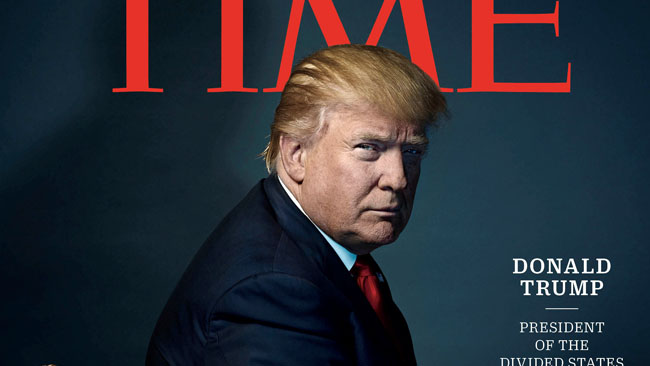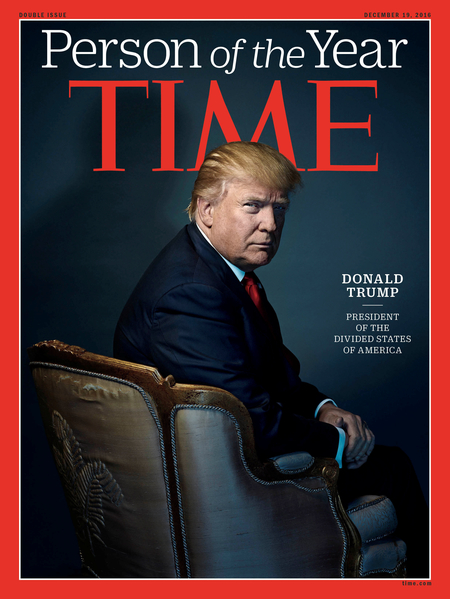Donald Trump’s conservative revolution:
lessons to Ukraine
It seemed until recently that nobody would save the US from decay and disintegration. The gravest dangers are extinction of the white population, uncontrolled migration, social parasitism, the clout of aggressive minorities, and systemic lies disguised as political correctness. The one who described this most frankly is the prominent American researcher Patrick Buchanan in such expressively-titled books as The Death of the West (2002), State of Emergency: The Third World Invasion and Conquest of America (2006), and Suicide of a Superpower: Will America Survive to 2025? (2011).
The sensational victory of Donald Trump in the 2016 presidential elections showed that the US is capable of rejuvenation. The middle class viewed Trump as white America’s last chance – and they did not miss it. This adds optimism to Ukrainians because we have a lot of similar problems: obvious extinction of the indigenous population, corruption, parasitism of the ruling top, and a tissue of political lies. Therefore, exploring the American revival is Ukrainian society’s No.1 task.
To begin with, almost all political observers and polling services forecast Trump’s defeat. As it turned out, “political science” and “surveys” were just a guise for electioneering. But bona fide researchers were also mistaken. Experts explain that the behavior of voters changed unexpectedly and the old sociological patterns no longer worked. The main surprise was that the Americans stopped expressing their views freely under the pressure of political correctness: they spoke the way they were supposed to but voted as they pleased. This means that a considerable part of society no longer trusts systemic propaganda. Accordingly, the “industrial machine” loses control over mass awareness. Hillary Clinton, who represented the ruling establishment, had an almost billion-dollar-worth election fund and support from the most influential media, but this did not help her.
Changes in the electoral behavior are a logical and eloquent confirmation of the ongoing transition of humankind from the industrial to the postindustrial formation. All this always begins with a change in the system of values. The values of a dying system are manipulations with crowd sentiments, moral nihilism, lack of esthetic taste, timeserving, tolerance for perversions and parasitism, mixing peoples and races and turning them into a faceless mass.
The new formation rubbishes all this and offers different values of life: truthfulness, non-conformism, the cult of beauty and health, coming back to basics, fair play, cleansing of parasitical processes, positive thinking, encouraging talents, and cherishing national identity. As the great Goethe said, “What is productive is true.” Donald Trump, his family, team, and newly-formed administration duly personify this new trend.
Yes, the US president-elect prefers a healthy way of life and admires human beauty. He won the affection of voters because he was not afraid to call things by their proper names. He has invited the same kind of non-conformists, including those who harshly criticized him, to his administration. Talent, adherence to principles, and competence are more important to Trump than personal loyalty. He seems to stick to the principle that “you can only lean against that which resists.” It is his “house style” of management to employ competing groups, which may have diametrically opposed views, examine their proposals, and make a final decision on his own. Trump is thus encouraging an unheard-of competition of ideas in Washington.
The largest US media, such as CNN and The New York Times, denied Trump access – instead, they baited, ridiculed, and demonized him for 18 months. For this reason, he focused on social websites, which helped him win. Programmer Brad Parscale and Silicon Valley specialists established some intricate behavior patterns based on the analysis of opinion poll results and posts on social networking sites. Concurrently, Trump’s supporters placed hundreds of trailers, witty pictures and memes in the Web, analyzed the users’ response, and chose the most effective ones. Incidentally, with a campaign budget half that of Clinton’s, Trump managed to spend five times as much as she did on new internet technologies and market studies.
Trump’s victory is viewed as a triumph of American nationalism and traditional values. US society elected the one who will first of all care about the interests of the American nation and only then about those of international entities and multinational corporations. The economic and political interests of certain groups will no longer be above national interests. Yet this does not cancel the overall process of globalization. Simply, the pendulum of civilization has reached the extreme point and swung into the opposite direction – from unification to diversity. From now on, the globalized world will be actively enriching itself with new ethnoses and states. This is a favorable background for the making of a Ukrainian nation. What are the main lessons of the American revolution to the Ukrainian middle class?
First of all, we must define what it is. Western sociology prefers a property-based approach: the middle class is those who occupy a place in society between the rich and the poor. The middle class earns stable incomes that are sufficient to meet a wide range of material and social needs. But this does not work in Ukraine, for it turns out in this case that 90 percent of Ukrainians are paupers and the share of the middle class is on the verge of a random error.
The point is that an oligarchic-ochlocratic union is the form of public administration in Ukraine: oligarchs manipulate the mob (ochlos) by way of preferences, subsidies, drugs, and the oligarchic media, while the mob steadily elects them to governmental bodies. Conversely, the middle class consists of the Ukrainians who are materially and mentally self-sufficient thanks to their own work. They are self-sufficient enough to afford to do what they like – despite the wishes of oligarchs.
It is these people who formed the movement of civilian and military volunteers. Thanks to these socially responsible and creative people, Ukraine is undergoing transformations, although the share of these “new Cossacks” is no more than 10 percent of the adult population. They are in fact the middle class which is now shaping a postindustrial Ukraine and a New Europe. It is this class that must learn a serious lesson from Donald Trump’s conservative revolution.
Firstly, the Americans showed that it is possible to set a new policy quite legitimately – without explosive street protests and within the limits of the current constitution. Manipulated street crowds is a thing of the past, while what matters today is mass-scale organization of the middle class.
Secondly, Trump and his followers had the courage to call things by their proper names, and the working Americans responded to the truth. The prospective Ukrainian leaders will only receive support when they offer the truth instead of customary political demagogy. This requires considerable efforts, but only in this way is it possible to shape a steady and active electoral nucleus.
Thirdly, Trump knitted together a very non-homogeneous milieu of the Republicans who sometimes have opposite views on the future. The internal competition of ideas is productive only if it occurs on the basis of a clear system of principles. To form this kind of a common conceptual basis is one more task for the new Ukrainian elite.
Fourthly, Trump expressed the movement towards a great future in the shape of coming back to the glorious past: “Make America Great Again.” This is a right approach, for vigorous development needs to rely on time-tested patterns. For Ukraine, this kind of conservative modernization means having to rely on its own historically tested spiritual, political, and economic models. We will have to look deep into our past, for the current version of Ukrainian history has very little to do with reality.
Fifthly, as the oligarchic system in Ukraine controls the main media, it is necessary to rely on digital technologies and adequate sociological patterns. The middle class really needs scientific and analytical centers of its own.
To sum it up, Ukraine needs a different kind of nationalism – intellectual, cultural, organized, and, hence, productive. If necessary, postindustrial nationalism may not be called “nationalism” at all. Donald Trump has proved that you should speak to your people not only honestly, but also in the language they understand.

REUTERS photo
Time magazine names US president-elect Person of the Year
The influential American Time magazine has named US President-Elect Donald Trump Person of the Year 2016. The Time cover reads: “Donald Trump, President of the Divided States of America.” In a comment to NBC News, Time managing editor Nancy Gibbs said that the decision this year was easy after Trump had won an unexpected victory in the US presidential elections. “When have we ever seen a single individual who has so defied expectations, broken the rules, violated norms, beaten not one but two political parties on the way to winning an election that he entered with a 100-to-1 odds against him?” Gibbs asked. “I don’t think we’ve ever seen one person operating in such an unconventional way have an impact on the events of the year quite like this.” It will be recalled that Time named German Chancellor Angela Merkel Person of the Year in 2015. Since 1927, the magazine has been selecting individuals, groups of people, or ideas that have made a noticeable impact in the past 12 months. Incidentally, Prime Minister Narendra Modi of India became Person of the Year on the basis of Time magazine readers’ vote.
Newspaper output №:
№76, (2016)Section
Topic of the Day





